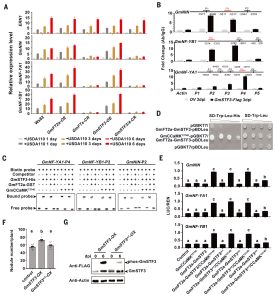Science has rescinded an expression of concern it issued one month ago after the authors provided data that “addressed concerns about the integrity of the paper.”
The journal had published the expression of concern for the 2021 article “Light-induced mobile factors from shoots regulate rhizobium-triggered soybean root nodulation” after two separate readers contacted the editorial team about an issue in the paper, as we reported at the time. The expression of concern noted that “that data presented in Fig. 5 assessed GmNSP1 expression rather than GmNIN expression.”
The article has been cited 43 times, according to Clarivate’s Web of Science.
The journal is publishing the newly submitted data as a correction, as well as an editor’s note explaining the removal of the expression of concern. The new notice states:
These changes have addressed concerns about the integrity of the paper. Therefore, Science has removed the Editorial Expression of Concern and posted this notification in its place to indicate the editors’ confidence in the Research Article’s data and conclusions. We thank the community for bringing these issues to our attention.
The corrected version of the paper now includes GmNIN expression data in figure 5, and updates to the supplementary materials.
Neither of the two corresponding authors of the article, Shiyong Sun and Xuelu Wang of the State Key Laboratory of Crop Stress Adaptation and Improvement at Henan University in Kaifeng, China, have responded to our request for comment.
Last week, Science Advances published an expression of concern after the authors of the article “Unemployment and underemployment are causes of suicide” notified the journal “of a quantitative error in their reporting of summary statistics” that they said did not affect their results or overall conclusions. The notice stated:
The authors regret this error and apologize to the community. Science Advances is examining the details of this issue and will proceed with a response as soon as sufficient information has been obtained.
The response from Science and its sister journal in these cases stands in stark contrast to the flagship publication’s failure to publish corrections to two of Marc Tessier-Lavigne’s articles that the neuroscientist and former president of Stanford University had submitted in 2015. “We regret this error,” Holden Thorp, editor in chief of Science, said in a statement to the journal’s editorially independent news division.
A journal spokesperson told us:
Science has been consistently more aggressive about correcting the record, where needed, in recent years. We take related matters very seriously and communicate such updates to reporters via the embargoed Science Press Package, to readers in our print and online issues, and via social media, to spread the word as widely as possible.
Like Retraction Watch? You can make a tax-deductible contribution to support our work, follow us on Twitter, like us on Facebook, add us to your RSS reader, or subscribe to our daily digest. If you find a retraction that’s not in our database, you can let us know here. For comments or feedback, email us at [email protected].

It appears that Science is not very keen on properly investigating this issue.
The paper does closely resemble typical papermill work.